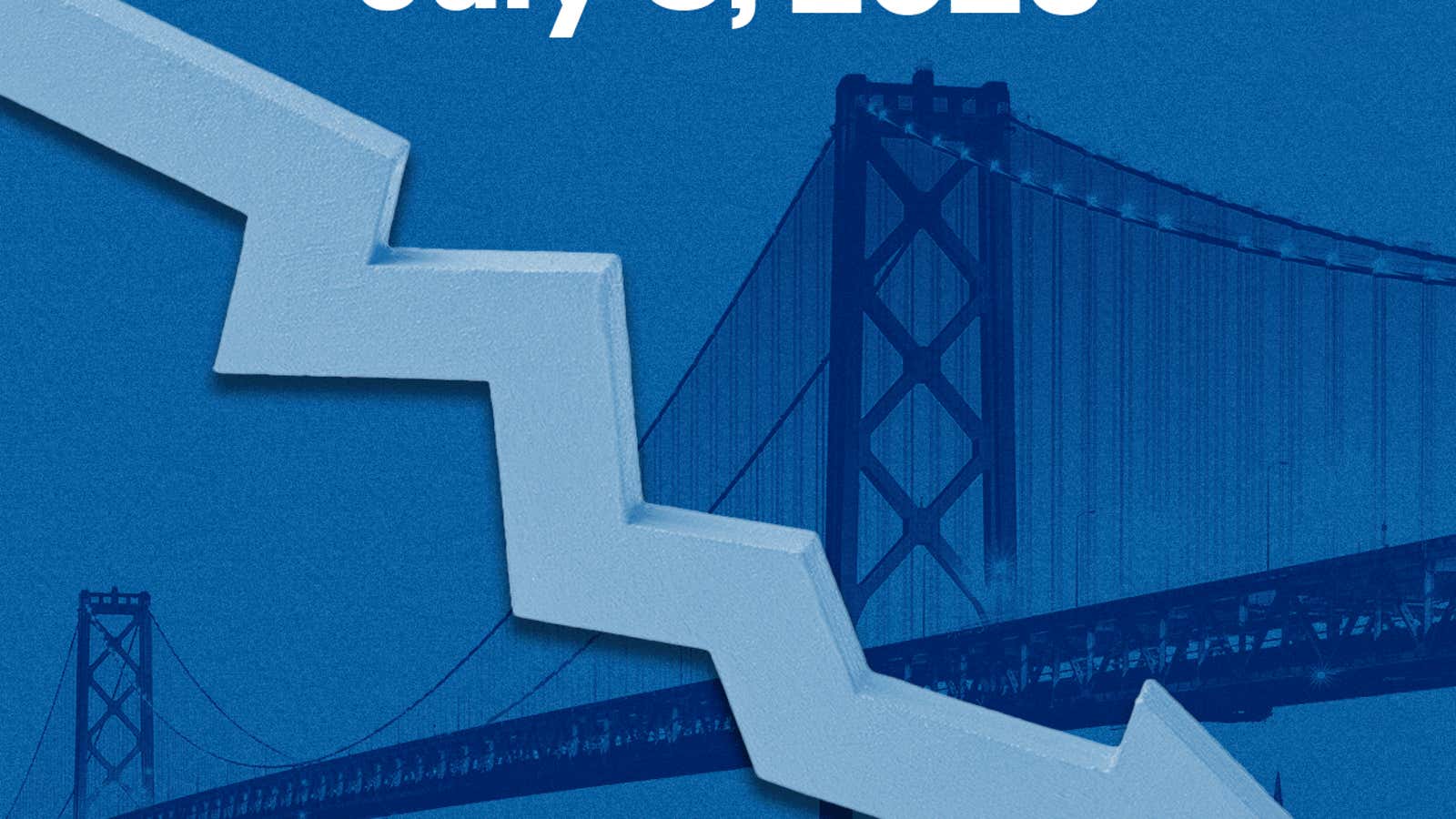Hi Quartz members!
You’ve probably read about San Francisco’s reputed slide into decay and misery. Reporters have called it “a failed city” that is “emptier, deadlier, more politically dysfunctional.” Even London’s Financial Times made the trip to write about how San Francisco is facing a “doom loop.”
As someone who lives across the Bay and visits San Francisco regularly with my one-year-old in tow, none of these descriptions constitute a portrait that I recognize. There are problems, yes, but also people living normal lives in a bustling city. Per the most recent data, San Francisco is safer than New York, Los Angeles, Houston, Chicago, Dallas, and other big American cities. And although drug addiction is a serious problem, San Francisco’s experience with fentanyl is on par with Philadelphia and Washington, D.C.
But this isn’t an apologia; rather, it’s a differing diagnosis. I live in nearby Oakland because of the key trend that is actually behind the problems in San Francisco—and the Bay Area more broadly: It’s too expensive. And it’s too expensive because there’s not enough housing, mainly due to restrictions on what can be built and where. As new jobs were created during the tech boom, new housing simply didn’t appear—and that failure is now telling on the city.
This may not be a politically convenient explanation for anyone; it may not indict the tech elite or law enforcement agencies. But affordability is the root cause of San Francisco’s famous homelessness issue, and, by forcing many workers to live elsewhere, it’s set the stage for the plunge in downtown traffic that has hurt the city’s commercial real estate market.
On July 6, the city’s chief economist said that the forecasts of doom for San Francisco are premature, and that the bleeding appears to have stopped. Part of his optimism comes from an expectation that overvalued commercial buildings will change hands and drop rents, attracting new tenants and beginning the natural cycle of recovery.
Philosophers have observed that what people hate most in others are what they hate most in themselves. That goes for cities as well, because the problems facing San Francisco are present in other wealthy urban centers. To see how housing scarcity hollows out local economies in the face of sclerotic opposition to change, just look at London’s disastrous housing market or New York’s lack of affordability.
At least in California, a coalition of people demanding change have pushed state lawmakers to force cities to allow more housing of all types and make it easier to convert malls into homes. After being hit with forecasts of doom in 1987 and 2000, San Francisco may have another comeback in it yet.
POP QUIZ
Who said THAT about San Francisco? Match the quote to the source:
1. “A derelict zombie apocalypse”
2. “This whole thing is just so blown out of proportion. They make it seem like it’s Armageddon.”
3. “A fractured and tribal body politic prone to manipulation”
4. “We can’t just continue being a city of those who are making a lot of money and those who are hardly making anything.”
A. Cushman & Wakefield vice chair Kazuko Morgan
B. SF Mayor London Breed
C. Twitter CEO Elon Musk
D. Sequoia Capital partner Michael Moritz
(Answers: 1-C; 2-A; 3-D; 4-B)
THE POLITICS OF HATING SAN FRANCISCO
Why does San Francisco attract so much ire?
San Francisco and the Bay Area have become symbols of both rapacious capitalism and liberal excess. There is some truth to the image, both historically and today. Defense contractors hurtling us into the atomic age coexisted with hippies during the 1960s, and Apple’s trillion-dollar corporate juggernaut abuts communes that are home to microdosing polycules.
In general, however, critics only see one side of the coin. In his book San Fransicko: Why Progressives Ruin Cities, Michael Shellenberger uses his reporting on homeless people as a political cudgel against Democratic city governments that have clearly failed to solve the homelessness problem. But his inaccurate reporting and reductive arguments miss the complex reality of the crisis. An aspect of the same ideology is also why Elon Musk and others blamed San Francisco’s alleged chaos for the murder of tech executive Bob Lee—at least until police arrested an IT entrepreneur on the charge of killing Lee in a personal dispute.
Meanwhile, books like Imperial San Francisco and Palo Alto: A History of California, Capitalism, and the World point at a history of exploitation that dates back to the area’s original colonization by European settlers. In this view, the exploitation of gig workers by Uber is of a piece with former California governor Leland Stanford’s interest in eugenics. But the theorizing can get a little sloppy: Amazon and Microsoft are held up as examples of Silicon Valley’s bad behavior—they’re based in Seattle, two states and a 13-hour drive away. It may be that the problems of capitalism aren’t geographically determined.
ONE 🤠 THING
Texan politicians have made hay of San Francisco’s problems and lured some companies from the Golden State, including major firms like Tesla and Oracle. Some point to taxes as a reason, but the average tax burden in Texas is higher than in California for most people.
A better answer is the regulatory environment. A lack of bureaucracy, for instance, has made it easier to find land, build wind and solar farms, and plug them into the grid. Texas has become a leader in building out renewable energy, far surpassing California.
Texas’s willingness to let people build is something California could learn from. But Texas itself is changing: Gregg Abbott, the Republican governor of the state, wants to thwart all this laissez-faire green activity with new rules for green projects and more subsidies for natural gas, nipping in the bud the very development that is helping Texas run ahead of California.
Thanks for reading! And don’t hesitate to reach out with comments, questions, or topics you want to know more about.
Have an un-foggy weekend,
—Tim Fernholz, senior reporter
